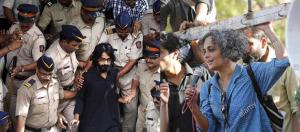As per the National Crime Record Bureau statistics of August 2015, in the previous year, 58 persons were arrested under the sedition law. But for three women, all others were men.
Sixteen of these cases concerned Bihar in which 28 arrests were made. Jharkhand had the next highest incidence of 18 cases and as many arrests. Orissa had three arrests and all three were women. Andhra Pradesh and West Bengal had cases registered under sedition law but no arrests were made.
Try as hard as you might, you won’t remember if any street demonstrations were held or newspapers/TV reporters devoted their front pages or prime time on such issues. You won’t remember lawyers sitting on “dharna” in front of courts. Or that political parties in unison asked for repealing of the sedition law.
Interestingly, both state and centre and their enforcement agencies take a call on prevalent laws and past instances and decide whether the matter is fit to be registered under 124A sedition law.
During the Patidar Unrest in Gujarat, the BJP government registered a sedition case against Hardik Patel. Same happened with Umar Khalid and Kanhaiya Kumar for raising “Pakistan Zindabad” slogans inside the JNU campus. In Chattisgarh, the BJP government registered a case under sedition law against Dr. Vinayak Sen for allegedly being involved in Naxalite activities. In Maharashtra, cartoonist Aseem Trivedi was booked under sedition law in 2012 for drawing cartoon in support of Anna Hazare movement on the complaint filed by Congress leader R. P. Pandey.
In 2010, Delhi Police booked famous writer and activist Arundhati Roy for giving anti-India speech, as well as on secessionist leader Sayyed Ali Shah Gilani. Lest it be forgotten, the UPA government was in the centre. The charges laid were that the speeches clearly asked for independence of Kashmir as the only alternative left for the long-smouldering problem.
Contrast this with 2016 in JNU when slogans such as “We will snatch freedom,” were raised. Suddenly the Congress leaders, in the name of fighting for students’ rights, took to streets. It’s the same Congress which had enforced sedition law with impunity for close to half a century. None of it was visible when UPA itself was imposing sedition laws on famous and not-so-famous of the land.
The same happened in Bengaluru in an event hosted by Amnesty International. The state government of Karnataka, a Congress one, registered a case under the sedition law. Again the bogey of uselessness of sedition law was raised.
In 2012, under the sedition laws, Tamil Nadu arrested 11 for opposing Kudankulam Nuclear Project. Rajasthan had Gurjar leader Kirori Singh Bainsla arrested under sedition charges for damaging the public property. But when the same law was applied on Hardik Patel in 2016, then Congress, Aam Aadmi Party and National Congress Party (NCP) supporters came out vigorously in opposition.
In December 2010, Noor Mohammad, a lecturer in the Gandhi Memorial College of Srinagar had a sedition case registered against him. In the question paper set by him, one of the paragraphs asked examinees whether students considered stone-pelters as heroes? Noor spent two months in jail and was then granted bail. But in 2016 political leaders fell over each other in trying to prove that stone-pelters in Kashmir were innocent children. Media compared terrorists with Shaheed Bhagat Singh and claimed them to be social media experts, demoralizing the security forces, if not putting their lives under risk.
All this happens in India because such anti-India elements know they could get away with murder. The sedition laws were framed by the Britishers for the Britishers. Now that British government itself has changed the sedition laws, its time India takes a relook.
However, a question begs an answer: Why in 70 years of independence, there was no debate on the matter? Why sedition law is suddenly abhorrent once Kanhaiya, Hardik Patel, Amnesty and Ramya have been brought under its ambit.
Intellectuals of course could confuse you with Nation-State differences and technicalities. But its time they understand that nation is not just a piece of land. It’s a real entity after generations sacrificed their lives and well-being for its integrity. Does it make sense to create divisions or break up the nation only because it suits narrow, individual interests.
(The writer is Editor, Zee News and a famous TV personality for over a decade now).


